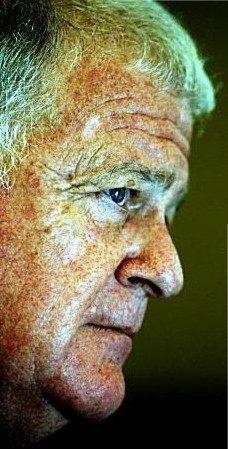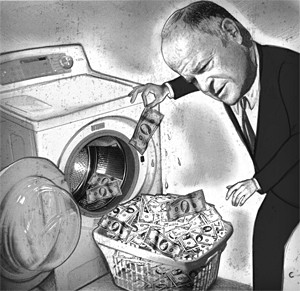| HOME | THE PURPOSE OF THIS WEBSITE | PERATA IN THE NEWS | THOUGHTS AND ANALYSES | WHAT OTHERS ARE SAYING | THE FEDERAL CORRUPTION INVESTIGATION |
|---|
| THE OAKLAND SCHOOL TAKEOVER | PERATA AND THE POLICE LAYOFFS | BUYING THE OAKLAND MAYOR'S RACE | THE VIDEOS | POST-ELECTION COVERAGE | STATEMENT OF RESPONSIBILITY |
|---|



An independent website not affiliated with any political officeholder or candidate or political campaign
Is Don Perata Trying To Bypass Oakland's Campaign Finance Limits In Order To Buy The Oakland Mayor's Office? Anybody But Perata Website From the latest city and state campaign finance reports filed by the Perata campaign [through June 30, 2010], it certainly looks that way. And it's not like Perata hasn't gotten away with this kind of thing before. We know that the Perata campaign is suddenly hurting for money. Perata has legally raised more money than any other candidate in the mayor's race, and he's had the benefit of outside-the-campaign financial help from both his statewide cancer initiative organization (see "The Cancer In The Oakland Mayor's Race") and from the California prison guards union (see "Don Perata And The Oakland Police Layoffs"). But Perata doesn't seem to feel that is enough, and so late in June he sent out a signed email appeal to supporters, asking for more donations. Perata also posted the new financial appeal on his campaign website.
"Over the past four months the goal posts have shifted," Perata wrote, "making a successful campaign more expensive to run. As uncomfortable as it is, I must ask you to consider making your first, or another, contribution to my mayoral campaign if you have not already donated the maximum allowable of $700." The $50,000 Loan The Perata mayoral campaign financial crunch apparently got so bad this summer that at the same time Perata was asking for more donations, Perata was loaning his own campaign $50,000. The loan came from Perata Consulting, Perata's political consulting business.
Generally there's nothing wrong or illegal or suspect about a candidate loaning money to his own campaign. It's a regular practice allowed by both California and local campaign finance regulations. But there was something a little suspicious about the timing and the amount of the Perata Consulting loan to the Perata For Mayor campaign, and that involves the California prison guards union. As reported by the East Bay Express this week ("Perata Stays On Prison Guards Payroll", August 3, 2010) the California Correctional Peace Officers Association (CCPOA)—the state prison guards union—has filed papers with the California Secretary of State's office saying that it paid Perata $60,000 between April and June of this year for political consulting work. What Perata is doing for the prison guards union to get that money—or what he has promised he will do in the future—is a question a lot of people are asking. But given the prison guards union's intervention in the Oakland mayors race with the police layoffs mailing, it would certainly seem likely that it's their intention that money going to Perata these days will be used to help Perata get elected Oakland mayor. If that is true, why didn't the California prison guards union simply give the $60,000 to the Perata Oakland mayoral campaign? The prison guards union couldn't give the money directly to the Perata campaign, because that much money in contributions from one organization would have violated Oakland's campaign finance law. Oakland imposes a $1,300 limit on campaign contributions from committees (Oakland Municipal Code Section 3.12.060) if the candidate has agreed to abide by the city's total campaign contribution limit ($379,000 for this election), which Perata has. Further, the prison guards union couldn't loan the money to the Perata campaign, because the same Oakland campaign finance law treats a loan to an Oakland political campaign as being the same thing as a contribution ("A loan shall be considered a contribution from the maker and the guarantor of the loan and shall be subject to the contribution limitations of this Act." Oakland Municipal Code Section 3.12.090).
However, a loan to the Perata mayoral campaign from Perata himself might be able to bypass the individual or committee contribution limits of Oakland's campaign finance law. While the Oakland law appears to be silent on whether a candidate can contribute unlimited amounts of money to his or her own campaign, California campaign finance law holds that "candidates [are] allowed to give unlimited amounts of their own money to their campaigns" (Analysis by Legislative Analyst of California's 2000 Proposition 34, "Campaign Contributions And Spending. Limits. Disclosure."). While Prop 34 did not apply to local campaigns, in the absence of any direct Oakland municipal law on the subject, Oakland would be expected to follow the State of California's lead that political candidates should not be subject to any limits in giving (or loaning) money to their own campaigns. Did Perata get around Oakland's campaign limits by getting the California Correctional Peace Officers Association to pay him $60,000 for "consulting" work, and then turning around and loaning $50,000 of that same money to his mayoral campaign? While there's no proof of this, it sure seems to be a reasonable conclusion. Financing The Police Layoff Mailers But the Perata Oakland mayoral campaign is running into another financial problem, a problem that pulling in more donations or loans directly to the Perata campaign won't help. What's the problem? It's that the Perata campaign has almost reach the campaign expenditure limited allowed by Oakland law. Oakland's campaign finance act allows that if a mayoral candidate wants to get the highest amount of allowable individual and committee contribution dollars available ($700 maximum for individuals, $1,300 for committtees or organizations), the campaign must agree to spend no more than a total of $379,000 in the election. Perata agreed to abide by that $379,000 limit in order to get the larger individual and committee amounts. But that's where the Perata financial problem comes in, because the Perata campaign has now reported a little more than $284,000 in campaign expenditures through the end of June on its official campaign reports to the city. That means that regardless of how much money the Perata campaign raises from now on, Oakland campaign finance law allows the campaign to spend only a little less than $86,000 between now and the November election. This is at a time when campaigns generally spend the most money for advertising and get-out-the-vote activities. In other words, the Perata mayoral campaign is in danger of not being able to spend any more money, just when it needs to spend money the most. How is the Perata campaign trying to get around this problem? To answer that question, we've got to go back to the Oakland City Council debate over the police layoffs. Earlier this summer, the Council debated laying off 80 Oakland police officers to help close the city's $31 million budget deficit. In the middle of that Council debate, Oakland residents were sent two political mailers sent by a group called the Coalition For A Safer California, opposing the police layoffs. The two police layoff mailers to Oakland residents took special aim at Oakland mayoral candidates and City Councilmembers Jean Quan and Rebecca Kaplan, leading many commentators to conclude that the mailers were more designed to boost the Perata mayoral campaign than they were to stop the police layoffs ("The Perata Gang That Couldn't Shoot Straight", "In Oakland, Perata Supporters Tied To Mailers On Police Cuts", "80 Oakland Police Officers Get Layoff Notices"). And as the Anybody But Perata website noted at the time, "East Bay Express and ... Oakland Tribune articles showed that the Coalition For A Safer California is largely funded by the California Correctional Peace Officers Association, the prison guards union that has close longtime ties to Perata" ("Don Perata And The Oakland Police Layoffs"). In its Statement of Organization Recipient Committee filed with the California Secretary of State's office last May, the Coaliton For A Safer California described itself as a "State Committee" whose purpose is "to support and oppose candidates for state and local office through independent expenditures." The Safer California coalition also describes itself as "sponsored by public safety organizations" and lists two sponsoring law enforcement groups on its report, the San Francisco Police Officers Association and the San Jose Police Officers Association.
But for an organization that's supposed interested in statewide elections and local elections all around California, the Coalition For A Safer California is recently drawing Oakland contribution dollars almost exclusively, once you exclude money the group gets from public safety organizations. In its Campaign Finance Contribution Report filed with the California Secretary of State's office for the period ending June 30, the Coalition For A Safer California listed $327,000 in financial contributions for the first six months of the year. Most of that money ($235,000) came from law enforcement organizations. But as reported here on this website and elsewhere, $150,000 of that law enforcement money to the Coalition For A Safer California came from the California Correctional Officers Association, the prison guards union with the close financial ties to Don Perata. Of the rest of the contributions to the Coalition this year ($92,000) that did not come from law enforcement organizations, $10,000 came from Anthem Blue Cross of Ohio. Other than that, every single bit of the non-law enforcement contributions to the Coalition For A Safer California this year came from companies doing business with the City of Oakland or individuals living in or near Oakland. Those contributions break down as follows:
Robert Gammon of the East Bay Express has noted the close ties between donors to the Coalition For A Safer California and Don Perata, writing that "contributors to the [Coalition For A Safer California] include longtime Perata supporters and campaign donors, including Foster Interstate Media, which is owned by the ex-senator’s close friend John Foster. Foster gave the group $25,000. Perata friend Ronald Dreisbach donated $10,000 to the group. Oakland lobbyist and Perata supporter Carlos Plazola and his business partner Laura Blair donated a total of $5,000." ("The Perata Gang That Couldn't Shoot Straight" June 29, 2010).
It is perfectly legal for "independent expenditure" political committees in California to "raise and spend as But according to the Commission, independent political committees must be truly independent in order to be able to spend unlimited money on California political campaigns. "Independent expenditures pay for communications (e.g., a billboard, advertisement, mailing, television and radio commercials) that expressly advocate the nomination, election, or defeat of a clearly identified candidate, but which is not made to, or at the behest of, a candidate," the Commission writes on its website explanation of independent expenditures. "These expenditures must be made completely 'independent' of the candidate; no coordination can take place between the candidates or their campaigns and the entity that makes the independent expenditure." (California Fair Political Practices Commission: Independent Expenditures) Even though both the Safer California coalition and the Perata campaign deny they worked together on the pro-Perata Oakland police mailers, it's hard to believe there wasn't some sort of coordination. Such coordination would be illegal, and it would be a way for the Perata campaign to solve its financial problems by getting around Oakland's campaign expenditure limits. But as the California Fair Political Practices Commission writes in its "Giant Gorilla" report, "such coordination [between campaigns and 'independent committees' is] difficult, if not impossible, to prove." He's Done It Before But even if it could be prove that the Perata campaign is violating Oakland's campaign finance law, the possible consequences to Perata are well worth the risk. After all, Perata has done this before and gotten caught, and still came out on top. In April of 2001, the California Fair Political Practices Commission reported the following findings about a Perata campaign violation: "Don R. Perata and Don Perata 98, FPPC No. 2000/156. (Index No. 70419.) In August 1998, Don Perata of Alameda was a candidate in the special primary election for the State Senate, Ninth District. Perata received a $90,000 campaign loan from his father, Richard Perata. The respondents failed to properly itemize the source of this loan, in violation of Government Code section 84211, subdivision (f) (one count); and the loan exceeded the special election contribution limit by $89,000, in violation of Government Code section 85305, subdivision (c)(1) (one count)" (FFPC Press Releases April 9, 2001) In 2004, the Los Angeles Times explained the circumstances that led to the FPPC ruling. "Under the rules in effect at the time," the Times wrote, "candidates in special [California senate and assembly] elections could not take donations of more than $1,000, though they could spend unlimited amounts of their own money on their races. Three weeks before the Democratic primary, Perata's terminally ill father gave him $90,000 for his campaign, according to an FPPC description of the case. Rather than report the money as a loan or donation, Perata put the money in his personal bank account. He then moved the money into his campaign fund. Perata's father died a week before the primary. With the $90,000 infusion, Perata bested his main rival, then-Assemblywoman Dion Aroner of Berkeley, by 942 votes. He easily won the general election that year in the heavily Democratic East Bay district." ("Perata Has Been Fined Twice For Campaign Finance Violations" August 16, 2004) The fine the FPPC imposed on Perata for the Senate campaign violation? $4,000. That was practically nothing in the arena of big-money politics where Perata plays, when he can get $60,000 in one shot from such groups as the California prison guards union. And because the violation had helped Perata win the State Senate seat, he came out ahead. Even when he got caught, Perata got over. So there is nothing, really, to stop Perata from continuing to bypass campaign finance restrictions in this year's Oakland mayoral election. Nothing, that is, but the judgment of Oakland voters, who must decide in November if we want our next mayor to be someone who regularly breaks Oakland's campaign finance law in order to buy the mayoral election. From the Anybody But Perata Website |
|
|
You can contact the Anybody But Perata For Mayor website at admin@notdon.org



